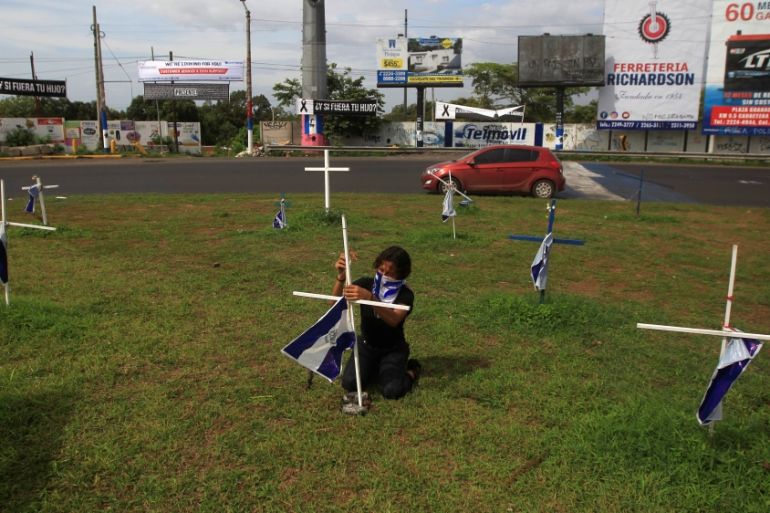Nicaragua protests: Five more killed as unrest continues
Clashes between protesters and police have left five more dead in Masaya as the government called for renewed talks.

At least five more people have been killed in Nicaragua as death toll since anti-government protests began over a month ago climbed to more than 110.
The reports came as the government called for renewed dialogue after talks with protesters broke down last month.
The latest deaths occurred in the city of Masaya between Sunday night and Monday morning, according to the Nicaraguan Association for the Protection of Human Rights (ANPDH).
One victim, identified as 23-year-old teacher Carlos Lopez, was reportedly killed by a bullet fired into his chest.
“He was executed, no doubt, by snipers,” Leiva told AFP news agency. “There is a profound violation of human rights” in Masaya, he said.
Another five had died in the flashpoint city on Saturday and a total of 62 people were injured over the weekend according to ANPDH.
Local residents had built barricades to defend themselves with homemade mortars and slingshots from attacks by what they said were anti-riot police and paramilitary forces loyal to Ortega.
Police accused hooded criminals “with firearms, mortars and Molotov cocktails” of looting and “creating terror and panic among residents”.
In a statement, they said a 21-year-old police officer was shot dead on Sunday in Masaya by “these terrorist groups”.
Catholic priest Augusto Gutierrez told AFP security forces had launched a “generalised attack” and multiple witnesses had told him stories of summary executions by police.
‘We all want peace’
Vice President Rosario Murillo, the wife of the embattled President Daniel Ortega, called for dialogue on Monday.
“We all want peace, we want dialogue, we want to work together and listen to each other, discuss all issues, because there’s a solution for everything,” she told state media.
The country’s Catholic Church had been mediating between the government and protesters, but talks broke down in mid-May.
Last Thursday, the church issued a statement saying it would not resume talks while the Nicaraguan people “continue to be repressed and murdered” after 16 people were killed in protests on May 30.
The anti-government protests erupted in mid-April over a pension reform bill, that has since been scrapped.
The protests have since broadened to voice frustration over corruption, the autocratic style of Ortega and Murillo, limited options to change the country’s politics in elections, and the president’s control over the congress, the courts, the military and the electoral board.
Protesters have taken to the streets, demanding the Ortega stand down. Authorities have been accused of using “lethal force” to crack down on the protests.
Ortega, a former Sandinista rebel who first ruled between 1979 and 1990 before returning as president 11 years ago, has kept power by maintaining leftist rhetoric while ensuring an accommodation with powerful private industry and keeping up trade with the United States.